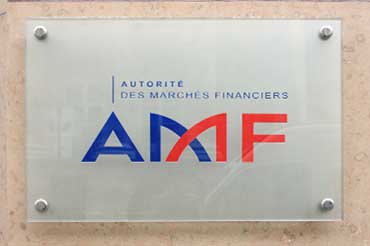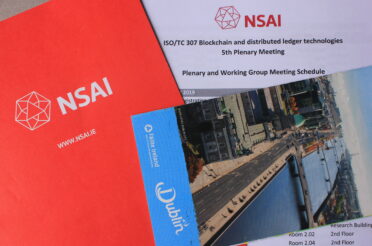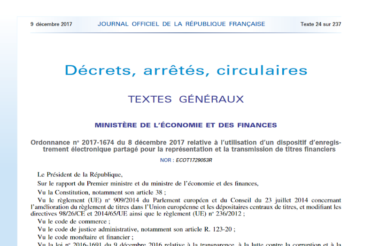III – The decree on minibonds or the challenges of the French government
(Read : first part – second part)
"The decree on minibonds will be published during 2017," Ms. Minister Axelle Lemaire, Secretary of State for Digital and Innovation, told me in substance when I was asked about it after her speech at the 1st "Parliamentary Forum on Blockchain" on October 4.
While the ordinance on minibons has been in force since October 1, 2016, the implementing decree, defining the conditions, including security, under which the issuance and transfer of minibons can be registered in a blockchain, is thus delayed.
Bad news, you may say, but no, on the contrary, it is rather good news! This seems to mean that the Government has become aware of the challenges it faces in the face of a complex, constantly evolving system. Will the Government involve members of the cryptocurrency community in the development of its regulations and encourage the development of best practices by the community?
A complex, evolving system
Before thinking about regulating the security conditions for the use of blockchain, it is important to go back to the basics of this technology.
First used by Hal Finney, who spoke to Satoshi Nakamoto about the "block chain", the term blockchain is closely linked to the open source Bitcoin protocol.
While the term is often used in the singular, there are currently over 700 cryptocurrencies that represent as many potential blockchains. The two best known blockchains are currently Bitcoin and Ethereum.
Unless we are talking about the Bitcoin blockchain, it is therefore essential to specify which blockchain we are referring to and whether it is a public or private blockchain. Especially since the security mechanisms are not the same from one blockchain to another. The younger a blockchain is, the more it will be in test mode and therefore a source of errors.
Indeed, like any computer system, blockchains work on a trial-and-error mode ("iteration"), leaving room for constant but necessary evolution. Moreover, contrary to what some may think, this technology is not so easy to understand, even with advanced computer knowledge.
The attack on the DAO (based on the Ethereum blockchain) that occurred in June 2016 changed the perception of ease that some neophytes could have had until then about this technology. The Government is also aware of this since during the "Parliamentary Forum on Blockchain", Minister Axelle Lemaire clearly referred to this event.
Also, in the context of its reflection on the elaboration of the decree on minibons, the Government could take into account the following factual elements:
- The Ethereum blockchain is very young (it is one year old) and is still in test mode and as such, like any new technology, is experiencing growing pains that it must first address to reach its full potential ;
- The Bitcoin blockchain is the only one that currently meets the criteria of maturity (it is now 8 years old and the oldest), reliability (entries on the Bitcoin blockchain are immutable to this day) and security (while intermediaries such as individuals or exchange platforms have experienced hacking problems, the Bitcoin network itself has not).
Moreover, as Alexandre David of Eureka Certification stated during Andreas M. Antonopoulos' visit to the Merkle Conference, a blockchain is nothing without the community that surrounds it.
Once again the case of the Ethereum blockchain (with the unexpected recognition of Ethereum classic) has shown the hitherto ignored importance of certain actors in the ecosystem: users (especially exchange platforms, individuals).
The Government will therefore have to take into account all the players in the ecosystem when drafting its decree.
A necessary cooperation with the cryptocurrency community and the development of best practices
Without a real understanding of this technology, any regulatory text may prove to be completely counterproductive: certain constraints imposed on platforms in the sector could open breaches in the security of the system or turn into a repressive system that instead of favoring companies in the sector, will drive them away.
It is essential that the Government engage in discussions with as many members of the cryptocurrency community in France as possible, such as Paymium, Ledger, la Maison du Bitcoin, Bitcoin.fr, Stratumn, OXT, Goochain, Coinizy, BitConseil, Blockchain Solutions, Woleet, Bitit, E-mProvement, Eureka Certification, Blockchain France, Utocat, Czam or Acinq, without forgetting associations such as le Cercle du Coin, Ethereum-Asseth or Chaintech.
Even if the cryptocurrency community is generally against the establishment of a repressive regulation, many members are aware that a regulation allowing to legally recognize the use of blockchain would be favorable to the ecosystem.
In addition, following the crisis related to the DAO, the Community has begun to develop the beginnings of good practices:
- The association le Cercle du Coin thus reminded developers that they "must keep a great vigilance in their projects. And especially, when these projects concern value transfers or financial investments. The computer security of blockchains requires specialized skills. Implementation errors in the code can have disastrous consequences;
- Vitalik Buterin, founder of Ethereum, recommended avoiding creating smart contracts worth more than $10 million,
- Péter Szilágyi, one of the developers of Ethereum Core, stated that "the DAO showed that more effort is needed in writing a smart contract than we originally thought."
In conclusion, if the French Government wants to develop an attractive regulation that will define the conditions for the use of blockchain, while allowing the development of the ecosystem, it will not be able to do so without a precise knowledge of this technology and the participation of the members of the cryptocurrency community.
For its part, I think it is important that the cryptocurrency community, which in France has begun to form associations, develops guidelines and intervenes with the government in this sense.
When the Internet was developed, coders and developers, noticing many mistakes related to the use of the Internet by neophytes, decided to create guidelines which are still in force today: the Netiquette. Why shouldn't it be the same with cryptocurrencies?
Sources :
– bitcoin.fr/ethereum-deux-forks-a-venir-a-la-suite-dun-hack
– e-ducat.fr/2016-09-19-questions-sur-ethereum/
– lecercleducoin.fr/presse/
– blog.ethereum.org/2016/06/17/critical-update-re-dao-vulnerability/
– blog.ethereum.org/2016/06/24/dao-wars-youre-voice-soft-fork-dilemma/
This article was first published on: www.bitcoin.fr







One Response
France wants to be the first to regulate blockchain in Europe (2/3) | Cabinet Michelle Abraham
[…] Read the third part of this article → […]